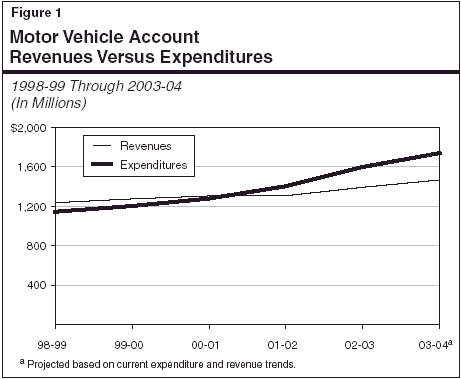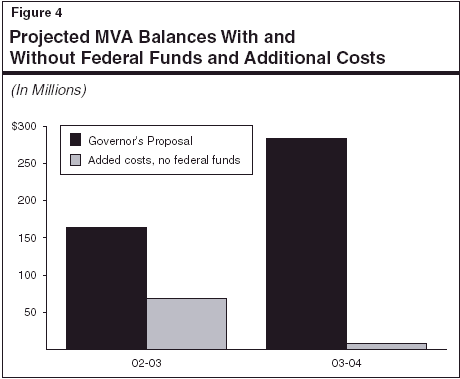Legislative Analyst's OfficeAnalysis of the 2003-04 Budget Bill |
The Motor Vehicle Account (MVA) derives most of its revenues from vehicle registration and driver license fees. In 2002-03, those fees account for 89 percent of the estimated $1.4 billion in MVA revenues. The majority of MVA expenditures support the activities of the California Highway Patrol (CHP) (70 percent), the Department of Motor Vehicles (DMV) (22 percent), and the Air Resources Board (5 percent).
In the last few years, modest growth in revenues to the Motor Vehicle Account (MVA) has not kept pace with rising expenses such as employee benefits and new antiterror programs. If no corrective actions are taken and federal funds for homeland security are not received, the MVA will face a substantial shortfall by the end of 2003-04 that will worsen in future budget years. The budget proposes to bolster MVA's condition largely through a combination of fee and penalty enhancements and a reduction in the California Highway Patrol's reliance on MVA by providing the department with funding from other sources.
In the last five years, MVA expenditures have increased by 40 percent, while revenues have grown just 13 percent. Figure 1 shows MVA revenues and expenditures from 1998-99 through the current year, and projections for 2003-04 based on existing trends. As Figure 1 shows, in 1998-99 MVA revenues exceeded expenditures by $92 million. The difference has dwindled every year since then, however, and in the current year expenditures are expected to exceed revenues by over $200 million. Figure 1 further shows that without corrective actions to raise revenues or to curb expenditures, that gap could grow to over $270 million by the end of 2003-04, resulting in a year-end deficit of approximately $200 million. This means that even if $170 million in federal funds are received in the current and budget years combined as the budget assumes, the account would end the budget year in a deficit.
A combination of factors has contributed to the deterioration of the MVA's condition. The CHP's costs have escalated due to heightened security activities since September 11, 2001. The MVA has paid for almost all of these added expenses, and has yet to receive any federal reimbursements. In addition, costs for staff benefits such as retirement, health insurance, and workers' compensation have risen dramatically in the last couple of years for DMV and CHP employees. Meanwhile, revenues have grown only modestly, and the current-year plan to raise an additional $40 million in fees from the sale of information was never implemented. As a result, current-year revenues are now estimated to be $20 million less than projected, while expenditures will be $69 million more than originally planned.

Fee and Penalty Increases Aimed at Boosting MVA Revenues. As part of its solution to this problem, the administration proposes to generate additional revenues by increasing fees and penalties collected by the DMV. As shown in Figure 2, these measures are projected to boost MVA revenues by $163 million in 2003-04 and $333 million annually thereafter. All of the fee increases would go into effect mid-year, and fees would be adjusted annually for inflation. Specifically, the budget proposes to:
|
Figure 2 Motor Vehicle Account Fee Proposals |
||
|
(In Millions) |
||
|
Proposal |
2003-04 |
Annual Ongoing |
|
Increase vehicle registration fees |
$95 |
$190 |
|
Increase driver license fees |
30 |
67 |
|
Increase identification card fees for nonseniors |
9 |
19 |
|
Standardize transaction fees |
15 |
31 |
|
Impose Business Partner Automation fee |
2 |
2 |
|
Enact new penalties for failure to file transfer of title documents |
12 |
24 |
|
Totals |
$163 |
$333 |
The Department of Finance indicates that legislation is needed to implement each of these changes.
Budget Proposes New Funding Sources for CHP to Supplement MVA. From 2001-02 to 2002-03, MVA support for CHP increased by 19 percent, from $949 million to $1.1 billion. For 2003-04, the budget proposes to keep CHP funding at about the same level as the current year, but to reduce MVA's share of the department's budget by $86 million. The budget proposes to shift this amount of support to three other funds: the State Highway Account (SHA) ($15.7 million), the State Emergency Telephone Number Account ($41 million), and a proposed new Public Safety Surcharge Fund ($31 million).
In all, the fee/penalty and funding shift proposals total $260 million in the budget year and $427 million thereafter. According to the administration, with these actions, MVA would have a balance of $284 million at the end of 2003-04.
The budget does not reflect a number of cost increases that are scheduled for 2003-04, relies heavily on the uncertain prospect of receiving $170 million in federal homeland security funds, and proposes some solutions that are problematic. In order to ensure that the Motor Vehicle Account remains in a healthy fiscal condition in the foreseeable future, the Legislature will either have to increase further some of the fees proposed in the budget, or reduce expenditures for the California Highway Patrol and the Department of Motor Vehicles below current-year levels.
Salary and Benefit Costs Could Be Significantly Higher Than Budget Reflects. Our review shows that the budget does not include a substantial amount of added costs that will likely require MVA funds. Specifically, the existing memoranda of understanding with state employees call for salary increases to go into effect in July 2003, including a 5 percent salary hike for DMV and nonuniformed CHP staff, and a 6.01 percent increase for uniformed CHP employees. As part of the solution to deal with the General Fund condition, the administration is in discussions with state employee groups to defer or modify these scheduled increases. If these renegotiations are unsuccessful, the increases would result in an extra $44 million in costs to the MVA in the budget year.
In addition, if the retirement rates for 2002-03 increase in the budget year as CalPERS anticipates, expenditures on retirement costs could be $62 million higher than budgeted. Moreover, health care and workers' compensation costs could go up several millions of dollars over the budgeted amount. All together, added costs to the MVA for salaries and benefits in 2003-04 could be well over $100 million higher than the budget reflects. These costs are detailed in Figure 3.
|
Figure 3 Potential Additional MVA Costs Not Reflected in the Budget |
||
|
(In Millions) |
||
|
|
Salaries |
Retirement |
|
DMV |
$10 |
$11 |
|
CHP nonuniformed |
7 |
7 |
|
CHP uniformed |
27 |
44 |
|
Totals |
$44 |
$62 |
Thus, even if MVA revenues come in on target in the budget year, the 2003-04 projected year-end balance could be less than $10 million if salaries and benefits rise to their anticipated higher levels, and if anti-terror federal funds do not materialize. Figure 4 shows the account's year-end balances as projected by the budget and if MVA expenditures are higher as a result of other factors.

Proposal to Enforce Payment of Title Transfer Fee May Not Be Feasible. A further potential problem lies with the administration's proposal to enforce payment of a $15 fee by new vehicle owners. Currently, whenever ownership of a vehicle changes hands (for example, when one buys a car, or pays off a car loan), the new owner is required to notify DMV and pay a $15 "transfer fee" within 30 days. The DMV estimates that only about one-quarter of these fees are collected. This is because new owners either do not know about the fee requirement, or choose not to report their transaction to the department. To address this situation, the administration proposes to assess a $15 penalty on those owners who fail to pay the fee on time. Based on our review of the proposal, it is not clear how effectively DMV will be able to track ownership changes and identify those new owners that are not in compliance. Thus we question the likelihood of DMV collecting $24 million per year (about $12 million in 2003-04) as proposed in the budget. While these amounts are relatively small in the context of total MVA revenues, their failure to materialize could be the difference between a positive and a negative year-end balance.
Funding Shift Proposals Are Problematic. We also have concerns with the administration's proposals to shift about $57 million in CHP's support costs to the State Emergency Telephone Number Account (911) and SHA. As regards the 911 Account, the budget proposes to increase the current 911 surcharge on intrastate phone calls, with a portion of the new revenues going to CHP activities related to responding to 911 calls. Based on our review, we conclude that the proposal is not justified because the proposed activities for funding (responding to 911 calls) do not relate directly to the purposes of the surcharge, which is to provide funds to maintain and operate the 911 telephone system. (Please see the "Crosscutting Issues" section of the "General Government" chapter for a discussion of this issue.) With regard to the proposed shift to the SHA, we find the proposal is not justified because the shift is based on an arbitrary allocation of costs, and would result in a cumbersome and inefficient system of timekeeping by CHP staff. (Please see our discussion of the SHA fund shift proposal in Item 2720, CHP.) Consequently, we are recommending against the shift of these expenditures to other funding sources.
Additional Revenue-Raising and/or Expenditure-Reducing Actions Needed to Avoid a Deficit. Given that expenditures will likely be higher than the budget projects, federal reimbursements are uncertain, and certain revenue and fund shift proposals are problematic, the Legislature will need to consider additional steps to take to prevent the MVA from slipping into a deficit in the budget year. For example, it could raise fees above the levels proposed by the administration. Approximately $27 million in additional revenue would be generated per year for every $1 increase in vehicle registration fees. For every $1 increase in driver license fees, $7.5 million would be raised. For every $1 increase above the proposed $15 standard fee on various transactions, the MVA would receive an additional $8.5 million in revenue. Alternatively, the Legislature could reduce CHP and DMV expenditures to below current-year levels, thereby avoiding a shortfall in the MVA. In order to do so, cuts in the departments' budgets would need to total several tens of millions of dollars.